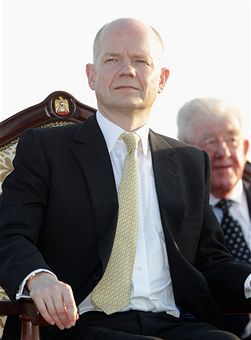 William Hague must be feeling that the incoming rounds are coming closer and closer. The
Spectator, The Daily Telegraph and now The Times (£) have each allowed their pages to be used
as Forward Operating Bases from which to launch attacks against the coalition’s foreign policy.
William Hague must be feeling that the incoming rounds are coming closer and closer. The
Spectator, The Daily Telegraph and now The Times (£) have each allowed their pages to be used
as Forward Operating Bases from which to launch attacks against the coalition’s foreign policy.
Even in the coalition’s own ranks, dissatisfied foot-soldiers (and a even a few senior officers) think that General Hague has lost his appetite for the fight. Tories talk about a man whose defeat in 2001left a permanent wound, and how the Christopher Myers fiasco left another gash. The government’s equivocal response to events in Egypt has provoked fresh criticism, while the army of eurosceptics, once Hague’s Praetorian Guard, no longer trust their commander.
But, as I’ve argued before, this is a bit unfair. The Foreign Secretary was always going to be criticised on the EU. And, more importantly, the post-9/11 world has few certainties to it. It is more difficult to travel to a midwestern US city and proclaim an eternal doctrine.
The one thing that can be said of the era is that it will be remembered for a shift of power from West to East. But the coalition has focused on this – more than 40 ministers have visited the Gulf to develop ties to the resource-rich region, and a little known NSC committee, chaired by the Foreign Secretary, is strong-arming other departments to do their part in a way Labour never did.
The FCO is also being reformed – not as fast as I would want, but Hague & Co. deserve credit for trying to ensure that Britain’s diplomatic back-offices are running efficiently and cheaply. Today, the Foreign Secretary and his Permanent Under Secretary are planning ambassadorial appointments years in advance – something that did not happen before.
The events in Egypt have, however, exposed two simple points. First, that the West/East issue is not the only one that matters in foreign policy: old issues like democracy-promotion remain, as does the fight against Islamist extremism. And, second, the FCO needs strong and, in part, ideological leadership if it hopes to do anything but manage Britain’s decline. With its focus on the BRICs and its deliberately non-idelogical policies (it contrast to Tony Blair’s certainty), the coalition has been over-reliant on innately cautious Foreign Office mandarins.
The crisis in the Middle East – and the fire directed at the FCO – gives the Foreign Secretary an opportunity to heed Marshal Foch’s advice and attack when hard-pressed. Hague should gather his top team and take stock of the coalition’s foreign policy – asking outsiders to come and give no-holds barred critiques. He should launch a Task Force to review the FCO’s structure. He should review how he communicates his message; and he must articulate a “Hague Doctrine” that renounces Blair’s certainties, but nonetheless makes clear what the coalition stands for. If he attacks now, enemy fire will be suppressed, and his own men will feel emboldened.






Comments